- Home
- Alice Hoffman
Green Witch Page 5
Green Witch Read online
Page 5
I’m so happy to see them.
The sparrows lead us to the edge of the river where there is a cottage made out of an old boat. Troy Jones loves old broken things. He announces that he thinks it’s the most beautiful house in the world. Maybe he’s right. It certainly is one of a kind. Instead of windows, there are portholes. Instead of a roof, there’s a white sail. Every time the wind rises, the house pulls toward the river, as if it yearns to be sailing, as if a house could have its own heart’s desire.
A dock trails out into the water. An old woman is there, a lantern beside her. She looks at least a hundred years old. She is the River Witch. Once she had been a fisherman’s wife. Now she wears a black shawl.
If she has gills like a fish, the way people whisper she does, we can’t see them. If her skin is made of scales, as the fearful insist, we can’t tell. To us she merely looks like a fisherman’s wife who has become a widow.
When I ask the River Witch if I can write down her story, she nods. I have added blue fish scales and water lilies to her paper. It shimmers like water, iridescent in the sunlight. But the back of the paper is brown and murky, like the river when it is flooding, when no one can control the way it flows.
Once, the fisherman’s wife had only been aware of all she did not have—she wanted a big house, a child, a life in which her husband did not leave her alone for weeks while he sailed down the river to the sea. When the fisherman made his boat into a house so she could travel with him, she had been disappointed. When he brought her bracelets and rings from far-off lands, she was never satisfied. The fisherman was so kindly he could not pass by someone’s despair without trying to lend a hand. The fisherman’s wife told him that he did too little for her and too much for others. He was always the first to help a stranger, rescue a drowning man, and that is what he did on the day the city burned down. He went out in a rowboat time after time, fishing out those who were swimming away from the fires to save their lives. The last time he went out, he didn’t return.
I didn’t know his worth, the old woman tells me. Until it was too late.
He washed up onshore ten days later, and ever since that time she has not moved from her place on the dock. She has been waiting for a reason to move. She will not leave this place until she can find a way to help others, as her husband once did.
The fisherman’s wife invites us to sit beside her. I wonder how she’s managed to survive. Why hasn’t she starved? She tells me the sparrows bring her bits of fruit and seeds. That is enough to sustain her.
But why do this? I ask.
The fisherman’s wife whispers. What she recounts is for my ears alone.
Because love is an act of will. You think it will just happen, but you have to make it so. Even when it’s gone wrong. Wait and see. If love doesn’t come to you, you have to go find it.
From the dock we can see the prison. There is the blue flag. There are the skulls. So close by, but because of the river between us, so far away. The soldiers of the Horde leave their horses in a pasture on our side of the river and use an old barge to go back and forth to the island.
I recall the photograph of Diamond riding one of those black horses. I feel angry and hurt, then I think of what the fisherman’s wife has told me. I will myself to wait, just as the fisherman’s wife sits on the dock, waiting.
I will not run away before I know the end of the story.
Since she has been sitting in the same place for so long, the fisherman’s wife knows more about the Horde than anyone. She’s been watching patiently the way a fisherman patiently waits for the biggest fish.
The news she has is grim.
The Horde, she says, gathers much the way they gathered before burning down the city.
This time, however, their eyes are on us. The villagers.
Not again, I think. Not us.
I ask how she can be sure. She says she’s seen them stockpiling barrels of gunpowder. She’s overheard soldiers discussing their battle plans.
It makes sense that they would come after us. We have the Finder. We have generators and windmills. The future is ahead of us. We have been starting over.
We have to go back and warn people that the Horde is on the way, Troy says.
No, I say. I feel certain of what we must do next. We have to stop them.
The old woman of the river agrees. While they are gathering for the attack, they have left their prisoners nearly unguarded. You must empty their prison and bring them defeat.
They are holding at least a hundred prisoners. How can we bring them back to shore? How can we rescue them?
The fisherman’s wife surprises us by rising from her place on the dock.
I finally have a reason to move, she tells us. I’ll help you in every way I can.
She walks slowly along the dock, then up a path made of fish bones. She has been in one place for so long she has to relearn how to walk. We try to help her, but she tells us that some things must be shared and some must be done alone.
When we reach the end of the fish-bone path, she shows us two large wooden levers on the porch of her house. Her husband had been a tinkerer, like Troy. He liked puzzles as much as he liked boats. If the levers are pulled, the house can be pushed into the river. It will be again what it had been before it was their house: a huge sailing ship.
Troy finds the planking the fisherman had once used to slip the boat into the water.
Now I know it was our dreamhouse, the fisherman’s wife says. When we slept together in bed, we dreamed of oceans, starfish, lagoons.
She takes a fishhook from her pocket. It’s small. It looks light, but when she places it in my hand, it is surprisingly heavy.
This is how much love weighs, she tells me. Nothing if you don’t take it when it’s offered. Everything if you accept what’s given to you.
We get on board and wait for the tide to rise. The world seems quiet, yet anything seems possible. The fisherman’s wife knows how to work the rigging. At last she has a reason to leave her dock, because we need her help. She has a reason to live again.
In the dark we edge toward the island. As we draw close we hear frogs, night birds, waves against the shore. We hear the Horde speaking in a language we don’t understand, just as we never understood how they could be so certain that heaven is on their side, that they alone have the right to chart what is a sin. For them, the past is the only marker. The future is nothing but dangerous territory. The death of innocent people is a price they’re willing to pay in order to build their vision of heaven on earth.
There is no language that can give a reasonable voice to that.
When I consider the Horde and the prison before us, I’m frightened. Then I think about my sister in the green market in the city just before the fire began, unaware that it was her last day on earth. There were blue skies, sunlight, crowds of people buying lettuce and peas. It should have been just another day, but it wasn’t. It should have been me, if I’d gone instead.
I am thinking about Aurora so deeply I can feel her beside me. I’m not as alone as I’d feared. A year has passed, and although I’m different, she is still the same. She will always be my little sister. I close my eyes and will myself to remember. The apples we picked, the songs we sang, the color of her hair, the way she would sleep on the floor with her little dog. I remember it all. If she were with me, my wild, fearless sister would say I have nothing to fear.
Go and don’t look back, I hear her say to me.
I am ready.
I take a stone, a feather, a rose petal, a fishhook.
I must leave behind Troy Jones and the fisherman’s wife and even little Onion. I have to go alone.
Troy doesn’t understand. I’m going, too, he insists.
One of us has to return to the village. If I don’t make it back, that someone is you.
Troy is about to argue, but the fisherman’s wife makes him understand.
Sometimes it takes as much courage to stay behind as it does to go, she tells him.
/>
It’s then he realizes that although he has found our way here, it is my place to go onward.
I move forward, into the darkness.
I am Green, used to being alone in the garden. Green, who can make anything grow. I hasten through the reeds and the tall grass as if I were invisible. Just Green, nothing more. The reeds are my armor and my protection. They are my story, the chapters that have been written and those that have yet to be. My feet are bare and I can feel everything growing right up through me, straight into my heart. I need to be hidden. To be one with the earth. I try to become the meadow I’m walking through. I breathe and think like a meadow. I am silent and still like a meadow.
Yet I move forward.
The Horde must think I’m a weed, a vine, nothing worth paying attention to. Then they hear something in the grass. Me. They turn with their rifles.
My heart is pounding inside my chest. I still have a heart, it seems.
I reach into my pocket for the feather the woman who had lost her children gave me. I hold it up, then let go. The wind carries it past the soldiers. They laugh when they spy the feather, relieved. They believe a bird is hiding in the reeds. That and nothing more. But it’s me, Green. Green, who has been in the highest tower, who has slept in the clouds, who has seen doves that can find their way even when they can no longer see, who once heard a lullaby that helped even the most frightened children fall asleep.
Even though I feel I am close to Diamond, I’m afraid that once I find him, one of us will have changed too much for the other to recognize. I will myself to remember what we meant to each other. It all comes back to me. That is what the future is. I see that now. The past and the present entwined into one.
There in the meadow I am no longer so alone, as I’d imagined I would be. I think of my mother, who was always so kind to strangers. She left food out at the end of our road for any passing traveler who might be hungry. She did not judge or place herself above anyone else in this world. You could tell her anything and she would listen. When she worked in the kitchen, boiling quince and apples for jam, rolling out pie crust, shelling beans, every move she made was beautiful. In her hands quince and apples became emeralds, rubies, a treasure. She never used recipes. She made it all up, working by instinct. She had her own ways of doing everything. If she were with me now, she’d tell me to trust myself.
Here is the way, I hear her say to me, and when I go on, I find the prison door.
I use the fishhook the fisherman’s wife gave me as a key. It works perfectly. One click and I’m in.
It’s murky in the corridors. There’s no light inside. I find my way to a staircase that leads to the very top of the tower, where I’d seen the blue flag in the window. It’s dark, but I hear the mur-mur of voices. There are no guards posted inside. Only the soldiers out in the grass. Everyone else is getting ready for the battle. But still, the voices continue.
My eyes adjust to the dark. I see people in cages.
I open the lock of each cage with the fishhook key as I pass by. Some of the people are ours, some are theirs, anyone who has disagreed with their methods or spoken out against violence and hate. Anyone who isn’t afraid of the future.
It doesn’t matter. In our escape we are brothers and sisters. They are all so grateful they want to follow me, offer their help, but I need to go on alone. I whisper where to find the boat.
Run, I tell them. Don’t be afraid. Don’t look back.
A single night isn’t long enough for all I have yet to do. I hurry until I am out of breath.
Once more I’m not as alone as I had believed I would be. I think of my father and how hard he worked. Our garden was nothing but brambles at first. He labored all day long and halfway through the nights, chopping back the tangled weeds, turning the soil, carting away stones, building the fences, the arbors, the well, where the water was always so clear and sweet. He told us we were beautiful, whether or not we were. We could have brambles in our hair, mud on our feet, and it wouldn’t matter. He told us we didn’t have to do anything to please him, except to be ourselves. Once I saw him crying over a deer a hunter had shot and left to die. I was stunned to see my strong father cry. But now if he were here, he would tell me that real strength has no boundaries.
The more you feel, the stronger you are, I hear him say to me.
Heart, soul, treasure, rain, sister, memory, knowledge, hope, will.
I hurry on, two steps at a time.
I am farther than I’ve ever been from my garden, yet I still feel the garden inside me. Red roses, sweet peas, blackberries, thorns. Lettuce, squash blossom, verbena, rowan, oak. Each plant that grows there has been a gift to me. Each one has made me stronger.
I remember everything about love as I climb the stairs. It’s coming back to me now.
How much does love weigh?
As much as a stone, a feather, a rose petal, a leaf.
It’s more than we can ever bear and less than we have the strength to carry. It is invisible. It’s right there in front of me. It’s made out of stones. It’s made out of air.
At last I come to a cell that is so dark, so hidden, the people inside can’t see me. When I whisper a greeting, they don’t respond. Thinking I’m one of the guards, they back away. I take the single petal given to me by the red-haired woman who still believes in love. I slip it into the cell. As soon as I do, it turns from white to red. Red as my roses, my blood, my heart.
That’s when I see his face in the dark, behind the iron bars.
I open the lock with the fishhook. The metal is light in my hands. Once the prisoners are released, they thank me. Though I don’t know their language, I know they are offering me a blessing. I nod, but I see only one person among them.
Diamond.
The other prisoners run down the stairs when I direct them to the boat, but he stays where he is.
Diamond.
He’s theirs, but he’s mine, too. More mine than anything has ever been.
There is no time for anything, but he kisses me.
I sent you a message, he says.
It is the first time I have heard his voice.
This feels like the greatest blessing of all.
His voice has returned. His throat has healed and he’s spent his time in prison learning our language.
This is a gift that is meant for me. He tells me that every time he learned a word, it was to say to me.
I admit that it had taken a very long time to get his message, the painting he’d sent to me, but at last I’d received it. Now I understand that the only thing that had kept us apart were my doubts. He has been with me even though I haven’t been beside him. He tells me so and I believe him.
He says he was captured while searching for his family, thrown onto a black horse, taken here. It was here that he found his family: his mother, his sisters, his cousins. All were in prison with him. Now I’ve freed them and they are with the group hastening toward the boat.
Now we are together at last.
Before he’d left, I had tattooed his skin. Half a rose, half a thorn, half a wing, half a leaf, half a heart. Diamond found ink and pins in prison and completed each one. He added grass and leaves to the ink he used.
As green as apples, he whispers to me. As green as the love of my life.
We climb the highest steps of the tower together. There are two guards there, but Diamond surprises them and locks them in an empty cell. Once they are no longer a threat, he whispers that he knows where Heather is. She’s had a child, and lately she’s been ill. The father of her child was one of the Horde who was supposed to be her guard but who had fallen in love with her. They’d married in a secret ceremony, attended by prisoners from both sides. But when her husband tried to rescue her, he’d been shot by his own people.
Heather’s cell has three locks. They must consider her dangerous. They don’t want anyone to see what they’ve done to her, how much they’ve taken away. Perhaps even they couldn’t find a way to explain a reason for s
uch suffering.
The first lock on her cell is gold, the second is silver, the third is made of iron. They’re so strong the fishhook key doesn’t work. But I still have the stone taken from my neighbor’s field in my pocket, the one that was supposed to tell my future, with a leaf growing inside. I crack off the gold lock and then the silver one. My hands are bleeding by now. Diamond wants to help me, but I know this is something I must do alone.
I come to the last lock, the most difficult one to break. When I hit it, the stone from my neighbor’s field crumbles into pieces. All that’s left is a single green leaf.
But the lock made of iron has opened. We push in the door.
Heather is holding her baby. It’s a boy. A scrawny, weak-looking thing. But his eyes are on me, watching.
Heather, I say. I run to be near her.
She’s happy to see me but nearly too exhausted to talk.
I didn’t give him a name, she whispers. She and the baby are burning with fever. They stare at something in the distance, as if they can only see some far-off place. I don’t know if he’ll last long enough to need a name in this world.
He’ll have a wonderful name, I say. But now we have to hurry. Your brother sent me. He’s waiting for you.
We run down the flights of stairs. Quick and quiet. There are mice, but we pay no attention. There are bats, but they cling to the rafters, wings folded up tight. The stone steps are cold and stained with blood. We don’t want to think about that now. The past is over and done. We’re running someplace brand-new.

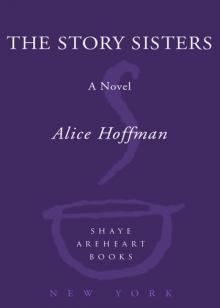 The Story Sisters
The Story Sisters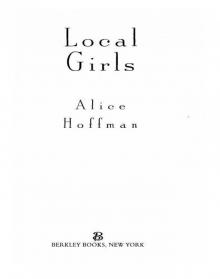 Local Girls
Local Girls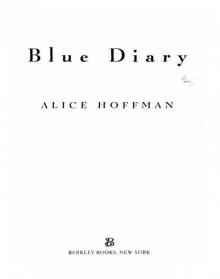 Blue Diary
Blue Diary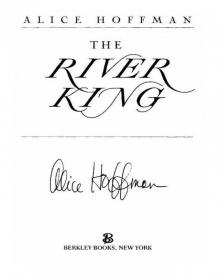 The River King
The River King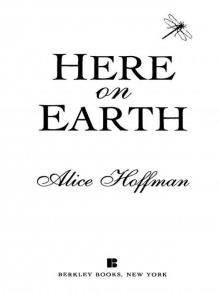 Here on Earth
Here on Earth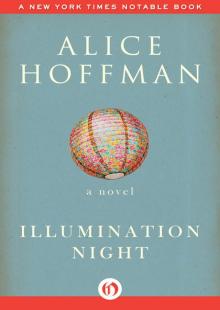 Illumination Night: A Novel
Illumination Night: A Novel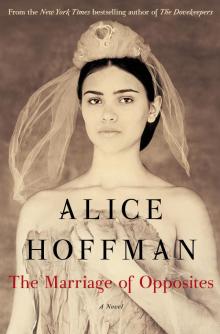 The Marriage of Opposites
The Marriage of Opposites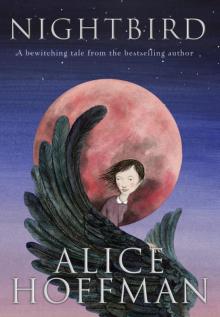 Nightbird
Nightbird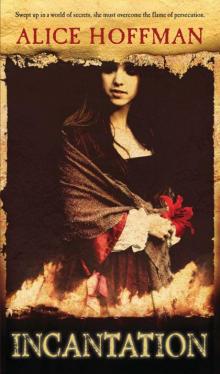 Incantation
Incantation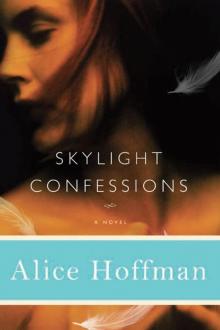 Skylight Confessions
Skylight Confessions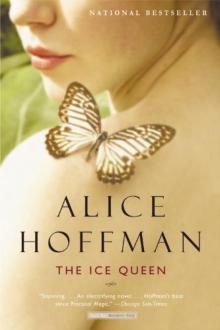 The Ice Queen
The Ice Queen Second Nature
Second Nature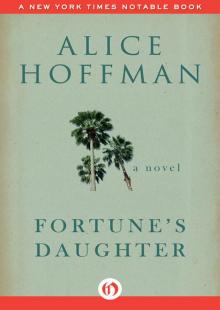 Fortune's Daughter: A Novel
Fortune's Daughter: A Novel Seventh Heaven
Seventh Heaven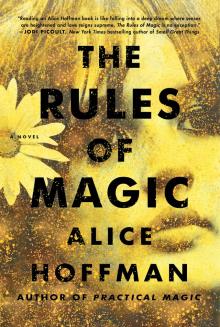 The Rules of Magic
The Rules of Magic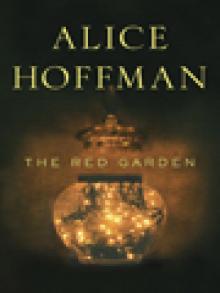 The Red Garden
The Red Garden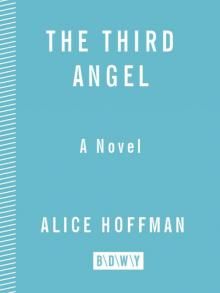 The Third Angel
The Third Angel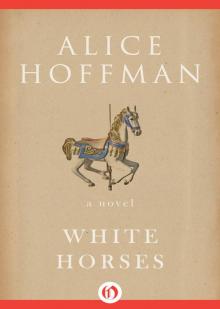 White Horses
White Horses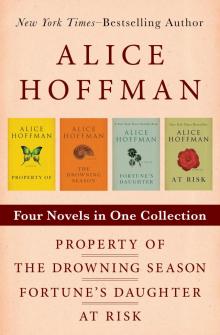 Property of / the Drowning Season / Fortune's Daughter / at Risk
Property of / the Drowning Season / Fortune's Daughter / at Risk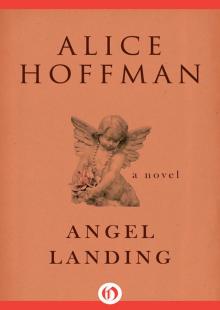 Angel Landing
Angel Landing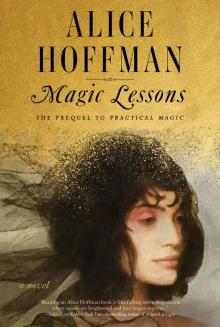 Magic Lessons
Magic Lessons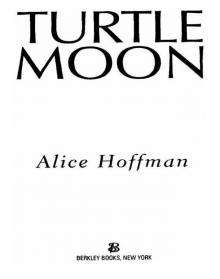 Turtle Moon
Turtle Moon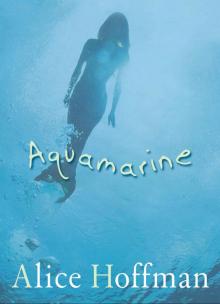 Aquamarine
Aquamarine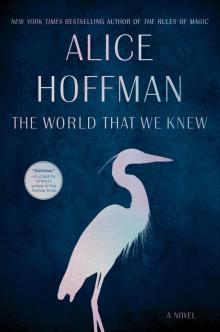 The World That We Knew
The World That We Knew Faithful
Faithful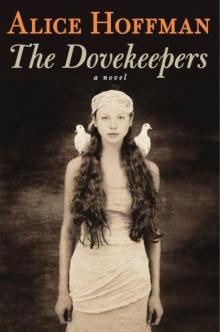 The Dovekeepers
The Dovekeepers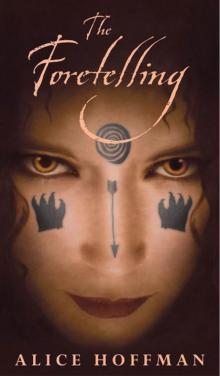 The Foretelling
The Foretelling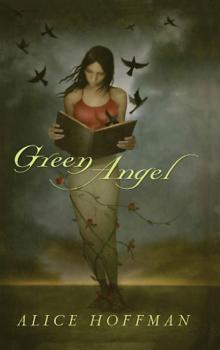 Green Angel
Green Angel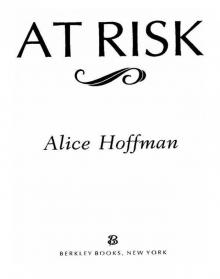 At Risk
At Risk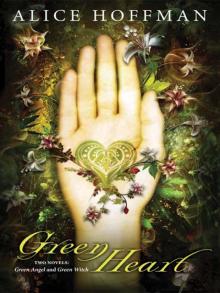 Green Heart
Green Heart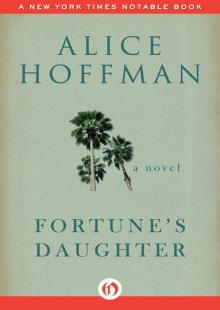 Fortune's Daughter
Fortune's Daughter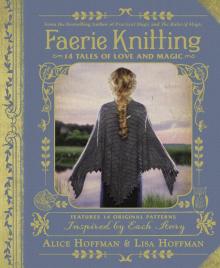 Faerie Knitting
Faerie Knitting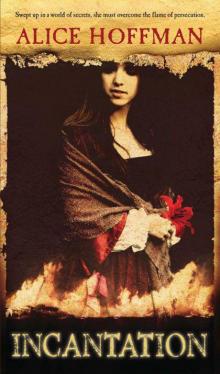 Incantation (v5)
Incantation (v5)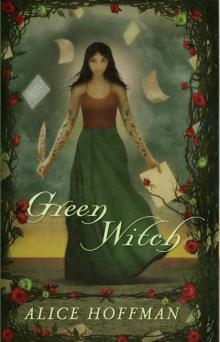 Green Witch
Green Witch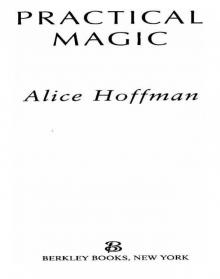 Practical Magic
Practical Magic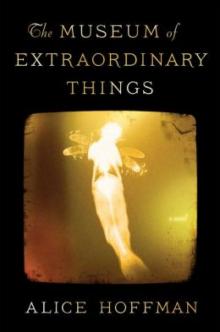 The Museum of Extraordinary Things
The Museum of Extraordinary Things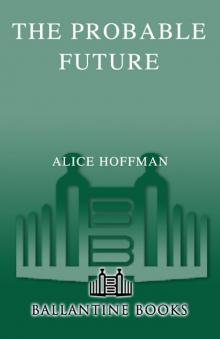 The Probable Future
The Probable Future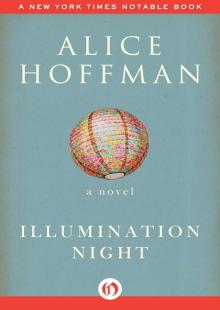 Illumination Night
Illumination Night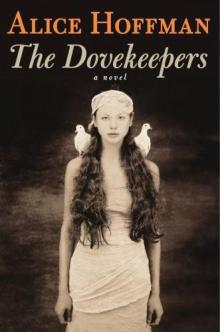 The Dovekeepers: A Novel
The Dovekeepers: A Novel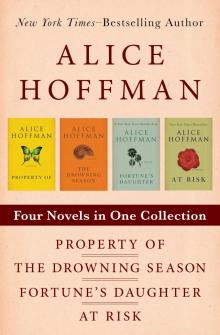 Property Of, the Drowning Season, Fortune's Daughter, and At Risk
Property Of, the Drowning Season, Fortune's Daughter, and At Risk